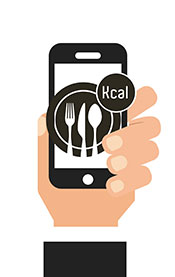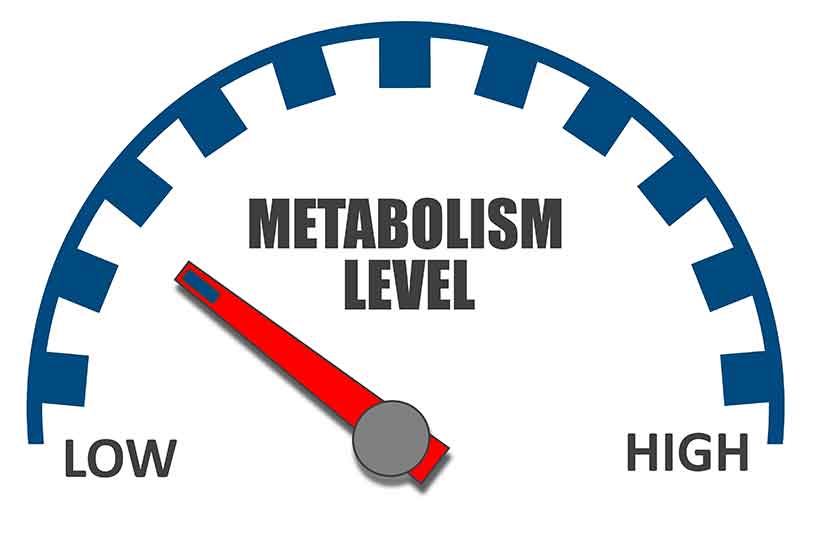
In other words; people want to lose weight quickly.
However, there is a big difference between crash dieting and losing weight in a healthy, sustainable manner.
So, just how long does it take to lose weight – and in a healthy way?
This article will look at the facts, figures and science behind this question, in addition to some sensible weight loss tips.
But first… why are crash diets a bad idea?
Sustainable Weight Loss Beats Crash Dieting
First of all, it is important to differentiate between healthy weight loss plans and crash diets.
Anyone can chase a weight loss target by following a severely calorie-restricted diet and lose large amounts of weight.
The problem is that such diets are not sustainable. For instance, what happens when we “finish” the diet and go back to our old way of eating?
Well, that old way of eating is what caused the weight gain in the first place, so it shouldn’t be a surprise when we gain fat again.
A few months later, it’s time for another unsustainable crash diet, and the cycle continues.
This manner of yo-yo dieting alternates between unhealthy eating patterns and starvation diets that lack nutritional value.
As such, it is a never-ending cycle of poor eating and an unhealthy way to live.
For sustainable weight loss and a diet that supports health, we need to find a way of eating that we enjoy.
And it needs to be one that encourages satiation.
A Sustainable Weight Loss Plan
In contrast to extreme calorie-restriction diets, a sustainable way of losing weight should emphasize foods that support satiety.
Here are two possible examples;
- A low-carb diet: A lower carbohydrate plan should include sufficient protein since it is the most satiating macronutrient. In addition, low carb diets should focus on nutrient-dense whole foods whether they are animal or plant-based (1).
- A moderate carb diet: For those who prefer a higher amount of carbohydrate, then it is important to focus on fibrous carbohydrate rather than refined carbs. For instance, fresh fruit, vegetables and foods like lentils and tubers offer more nutrients and more satiation. Sugars, flours and other ultra-processed products offer little nutrition and do not satisfy our appetite (2, 3).
Sample Plan
A day of low-carb meals providing approximately 1500 calories per day might look like this;
- Breakfast (461 calories): 3-egg and 1 oz cheese omelet (400), 1 cup of blackberries (61).
- Lunch (516 calories): 1 can of tuna (160), 1 tbsp olive oil (135), 1 tsp balsamic vinegar (5), 2 chopped tomatoes (45), 1 cup lettuce (10), 1 oz almonds (161).
- Dinner (541 calories): 8 oz beef (430), 1 cup of mushrooms (15), 1 cup of spinach (7), 1 medium onion (44), 10 cloves roasted garlic (45).
Of course, we are all different with varying personal intakes and total food intake requirements. This is just a very basic sample of something that could work.
Need more carbs and calories? Then add some sweet potatoes/yams.
Want more calories but without much digestible carbohydrate? Avocado, cheese, olives and (85% +) dark chocolate are your friends.
Calorie Counting – Is It Necessary?
You may have noted the sample plan above with the listed calorie information; does this mean we should track calories?
Maybe yes, maybe no.
Firstly, it is much easier to eat right for those who have a good idea about the nutritional value of different foods.
If you know the general nutritional profile of foods, then calorie counting may not be necessary.
For example; choosing the right foods, eating to satiety, monitoring and adjusting can work very well.
However, it is important to remember that not everyone is the same. For some people, nutrition is very confusing.
The Case For Tracking
If you don’t comfortably know each food’s nutritional profile, then it may be better to keep track of what you are eating.
For example, while foods like cheese and nuts are very healthy and fine in moderation, they contain substantial amounts of energy.
And whether they are healthy or not, we will gain weight if we overeat these foods.
Do you have a general idea of the right foods and the amounts in which to eat them?
If not, tracking calories can be useful.
If you feel more comfortable tracking what you are eating, then My Fitness Pal is a useful application.
However, it’s vital that we don’t judge foods solely on their calorie content.
For instance, nutrient-dense and protein-rich foods are more satiating, and satiation leads to fewer food cravings.
This better appetite regulation results in a natural reduction of food (and calorie) intake.
How Much Weight Can I Lose in One Week?
As we discussed earlier, many people want to lose weight very quickly.
Perhaps there is a significant event… a date, a beach holiday or any other number of reasons for this.
As a result, “how much weight can I lose in one week”? is a common question people have.
The answer? Unfortunately, it isn’t a lot.
Expecting to lose 20 or 30 pounds in a week—or even a month—is neither realistic nor healthy.
The one exception where it is possible to rapidly (in days) lose a more considerable amount of weight would be a very low-carb ketogenic diet.
However, this wouldn’t be fat loss and would be predominantly the loss of water weight.
Low-carb dieters lose large amounts of water weight over the first few days of reduced carbohydrate intake as insulin levels fall (4).
For the average, slightly overweight person, a sustained weekly weight loss of 1-2 lbs is a good target to have.
How Much Weight Can I Lose in One Month?
Another common question and one with a similar answer is how much weight we can lose in a month.
Again, I would say that a monthly loss of around 4 to 9 lbs is a realistic target for most people.
Of course, this is not a hard and fast rule for every individual.
In some cases, individuals suffering from severe obesity would be able to lose more and still follow a healthy diet. But for the average person who isn’t vastly overweight, an upper amount of around 9 lbs is realistic.
“Slow and Steady Wins the Race”
While these weekly and monthly weight loss targets don’t sound like a lot, we shouldn’t underestimate just how much weight a pound of fat actually is.
Furthermore, over a one-year period, these weekly losses would equate to somewhere between 52 and 104 lbs.
A considerable amount of weight, and much more than the majority of people need to lose.
With any weight loss plan, it is essential to take a long-term view rather than solely looking at the short-term.
Losing weight in a safe, sustainable and healthy manner comes first.
How Long Does It Take To Lose Weight In a Healthy Way?
First of all, here is a table showing how long it takes to sustainably lose weight at a rate of 1-2 lbs per week.
| Intervention | Results |
| 1 | 1 – 2 lbs |
| 4 | 4 – 8 lbs |
| 10 | 10 – 20 lbs |
| 12 | 12 – 24 lbs |
| 24 | 24 – 48 lbs |
| 52 | 52 – 104 lbs |
Yes, the amount of lost weight in one week doesn’t look overly exciting.
But look at 12 weeks – a potential loss of 24 lbs in less than 3 months is a significant amount of weight.
While initial progress may look slow, slow and steady leads to dramatic improvements.
Why Shouldn’t We Aim For a Higher Rate of Weight Loss Per Week?
There are three main reasons why pursuing faster rates of weight loss might be sub-optimal.
These include nutrient intake considerations, muscle catabolism and, potentially depending on the diet, adaptive thermogenesis.
1) Nutrient Intake
To lose more significant amounts of weight, we need to consume an overall smaller amount of food.
Someone who is severely obese could probably halve the amount they are eating, lose weight and still get sufficient nutrients.
However, for the majority of people?
Losing weight at a rate higher than 2 pounds per week would require severe restriction of food. Importantly, this would make nutrient deficiencies likely due to inadequate intake of vitamins and minerals.
Additionally, not eating sufficient protein (and nutrients) can reduce satiation and increase the desire to eat. (5, 6).
Increased food cravings are the last thing we want when trying to lose weight; deprivation and non-sustainable diets are not healthy.
2. Muscle Catabolism
It would be nice if we could drop unlimited amounts of body fat in a short period without consequences. However, if we reduce our food intake too much, then a decent proportion of weight loss will be lean muscle mass.
The reason for this is something called catabolism.
The catabolic process breaks down lean muscle mass to provide fuel in times of need.
Put simply; an under-nourished body will take protein from our muscles to compensate for the lack of nutrition in the diet. This situation occurs when the body is in something known as a ‘catabolic state’ and it happens as a result of inadequate nutrition (7).
Unfortunately, this process has some secondary adverse effects too; for instance, the more muscle mass we have, the more fat we can burn. Insufficient nutrition and extreme dieting can break down our lean muscle mass which then decreases the rate at which we burn fat (8).
As long as we don’t aren’t too extreme in our dieting, we can avoid significant muscle catabolism. Eating plans higher in dietary protein also help to protect against it (9).
3) Adaptive Thermogenesis
Sometimes people refer to adaptive thermogenesis as ‘starvation mode’.
In short, it refers to the body’s push back against weight loss (10).
Rapidly losing large amounts of weight could potentially cause problems, so the body tries to slow weight loss down. This situation is all about homeostasis; our body’s desire for a stable and sustainable environment.
Generally speaking, if there is less energy coming in, then our body wants to conserve energy and reduces the amount going out. It does this by lowering our resting energy expenditure (REE) and total energy expenditure (TEE) rates.
However, this isn’t an exact science; there is no hard and fast rule, and any drop in the metabolic rate will vary depending on the individual situation.
One interesting consideration on this topic is that lower carbohydrate diets may have a kind of metabolic advantage.
A controlled study found that, after patients lose significant weight, resting energy expenditure (REE) and total energy expenditure (TEE) decreases much more on low-fat diets compared to low-carb (11).
You can see the data from this study below;
Key Point: Unrealistic weight loss from rapid crash dieting is rarely sustainable. Losing weight too rapidly will cause our body to try and conserve energy – hence a drop in energy out (and slower weight loss).
Lifestyle Considerations For Weight Loss
Despite the focus on nutrition in this article, losing weight is very much a whole lifestyle intervention.
Especially, sufficient sleep is essential since it regulates our hormones and keeps our blood-glucose levels stable.
There are also plenty of studies showing that sleep insufficiency leads to weight gain. Whether this is solely through hormonal pathways or food cravings and a subsequent increase in food consumption remains in question (12, 13).
The following lifestyle actions can help support a good nutrition program;
- Sufficient daily sleep: 7+ hours sleep per night.
- Resistance training: weight-bearing exercises build lean muscle mass and increase our resting metabolic rate (14).
- More movement: walking when possible and staying active.
- Taking up a sport: for exercise, social, and stress-reducing benefits.
All of these things help to complement (not replace) a healthy diet.
Final Thoughts
There are many different ways we can lose weight, but a sensible and nutritious diet plan should always come first.
For long-lasting results, we need to stop looking for quick-fix solutions such as unsustainable diet plans and weight loss supplements.
Slow but constant weight loss will always beat extreme crash diets, and focusing on food quality will help to sustain healthy eating habits for life.
If we follow a sensible plan, it shouldn’t take long to achieve sustainable and healthy weight loss.






